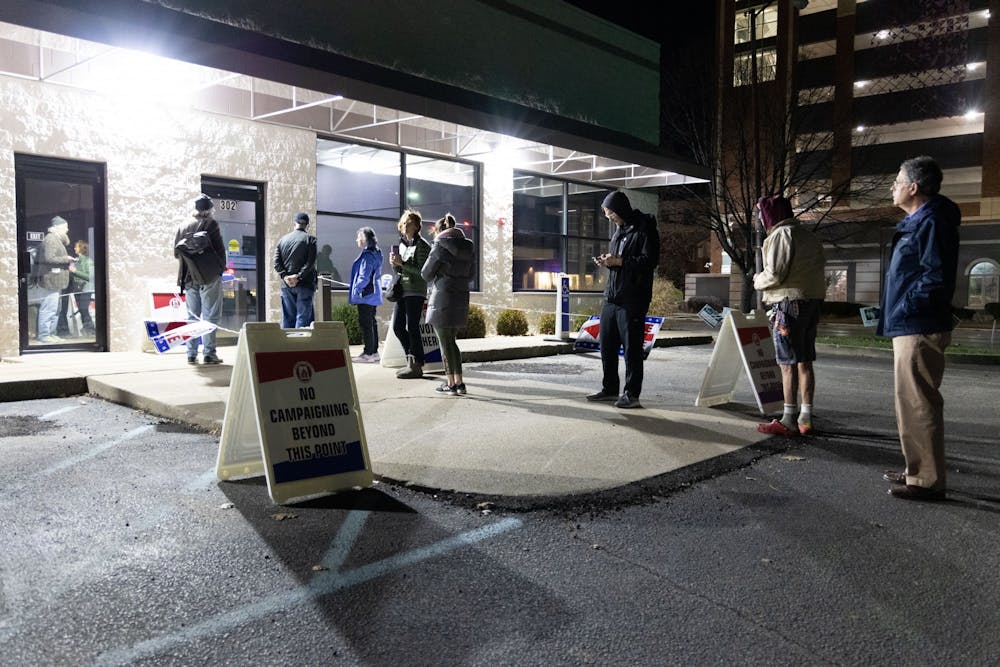The 2022 midterm elections came and went, leaving a divided Congress in their wake. Democrats will keep control of the U.S. Senate, though their exact majority is still to be determined, and Republicans were determined to have won the House of Representatives Wednesday night.
So, where does Indiana, specifically Bloomington, end up in all this? The answer: in largely the same position it started, according to IU political experts.
“There’s just not a big story here in terms of any likely changes in policy,” said Marjorie Hershey, professor emeritus of political science.
Related: [Winning candidates from the Monroe County Midterm Elections 2022]
Bloomington has been stable in its policy preferences for a long time, Hershey said, and there’s no big differences to report from this election cycle. Areas that lean Democratic, like Bloomington, are likely to keep getting more liberal because of increased polarization.
Paul Helmke, three-term former mayor of Fort Wayne and O’Neill School of Public and Environmental Affairs professor, agrees. Bloomington is a blue dot in a red state, he said, and because there wasn’t any partisan change on a county level, he sees it as a change in personnel rather than a change in policy.
What Hershey and Helmke both highlighted locally, however, was the upcoming mayoral race. Incumbent mayor John Hamilton is eligible for a third term, but this summer, two potential challengers emerged in Bloomington City Council President Susan Sandberg and IU Center for Rural Engagement Executive Director Kerry Thompson. More announcements may still come.
Local issues that may be discussed around the mayoral election may include annexation, Helmke said, which was a major issue earlier this year. Additionally, he said the fight around this election’s school funding referendum, which recently passed, may bring further attention to teaching and education funding.
At a state level, residents are also likely to see a lot of the same, said Elizabeth Bennion, IU-South Bend Chancellor’s Professor of political science. Because the Republican party maintained a supermajority, Democrats don’t have leverage to create change and will have to rely on making bills more bipartisan.
“The supermajority ensures that, even if Democrats were to stay home while the legislature was in session, Republicans could still continue with business as usual,” Bennion said.
Related: [LIVE UPDATE: Scenes, news around Monroe County on Election Day]
While partisanship didn’t change, several candidates swapped out, which may affect bipartisan legislation. In Indiana’s ninth House district, Republican Erin Houchin was elected to replace incumbent Republican Trey Hollingsworth, who stepped down. Her voting record is likely to be similar to Hollingsworth's, Helmke said, as she’s hit many of the same conservative talking points.
Moving forward, there will likely also be increased focus on the Indiana Secretary of State’s office, which is now headed by Diego Morales, Bennion said. This comes from concerns about his past performance and the allegations of election fraud and sexual misconduct that followed him throughout the last weeks of his campaign. Morales ultimately underperformed in the election compared to other Indiana state Republican wins. However, Bennion sees this attention as a potential positive.
“There will be a lot more intense scrutiny on that office, but that level of scrutiny can actually serve as a form of accountability,” Bennion said. “Given concerns about election integrity, which includes both concerns about access and accuracy, we might want to see the person in charge of our elections running an office that is not ignored and is not operating in the shadows, but one which people are paying close attention to.”
The biggest state-level priority will likely be the economy, Bennion predicted. Aiming to get inflation under control as well as recruiting and retaining Indiana’s workforce was critical for many voters. Hoosiers will also likely see the issue of abortion return, as Senate Bill 1 is still in court.




